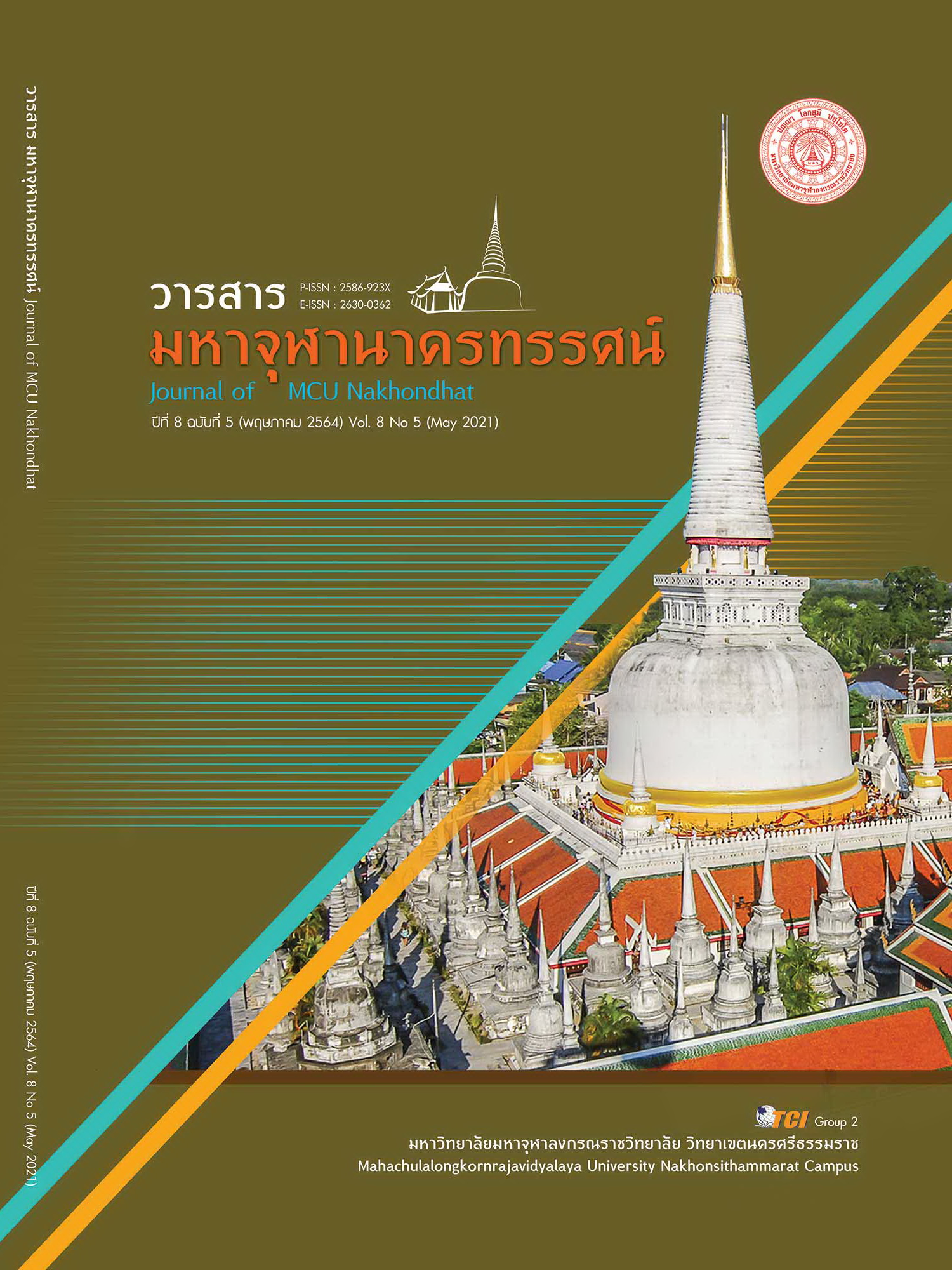FISHERIES CO - MANAGEMENT IN THAILAND
Main Article Content
Abstract
The purpose of this article is 1) to gather knowledge on fisheries co - management and 2) to study the ways in which fisheries co - management can be applied in real - world communities in Thailand in order to solve the problem of the reduction of aquatic animals. Based on the data collected, the concept of fisheries co - management originates with the government, fishermen, and other related stakeholders who have the awareness of the natural resource issue, and come together to resolve it in an equal partnership. This article presents the communities are fisheries co - management. First community is a conservation of the fishery resource group in sea farming at Songkla province and second community is the aquatic resources management area in Trang province. However, due to the differences in the contexts of various communities, the results of the application of this concept can vary, with some being successful and others not. One reason that leads to the failure of fisheries co - management is the legal issue which is unclear in terms of the allocation of responsibilities between the local government and the state government regarding the development in fisheries. So, the government has to design the law for decentralize fisheries management to local government. This law must consider base on community right. Then the government transfer allocation of responsibilities about natural resources to local government. The local government must support local ordinance from the participation by the people.
Article Details
References
ชล บุนนาค. (2554). แนวคิดว่าด้วยการจัดการทรัพยากรร่วม: ประสบการณ์จากต่างประเทศและแนวคิดในประเทศ. กรุงเทพมหานคร: สำนักงานปฏิรูป.
วิสุทธิ์ ทองย้อย และคณะ. (2559). รูปแบบการจัดการทรัพยากรทางทะเลและชายฝั่งร่วมในพื้นที่เขตอนุรักษ์สัตว์น้ำวัยอ่อน 4 หมู่บ้าน (เขตเล - เสบ้าน) จังหวัดตรัง. ใน การประชุมวิชาการระดับชาติและนานาชาติ ครั้งที่ 7 (น. 604 - 621). สงขลา: มหาวิทยาลัยหาดใหญ่.
ศิริชัย กุมารจันทร์ และคณะ. (2559). การมีส่วนร่วมของประชาชนในการจัดการทรัพยากรประมงในลุ่มน้ำทะเลสาบสงขลา. วารสารนิติศาสตร์ มหาวิทยาลัยอัสสัมชัญ, 7(2), 96-112.
สยามรัฐออนไลน์. (2563). กรมประมงหนุน 250 ชุมชนประมงท้องถิ่น ฟื้นฟูทรัพยากร พัฒนาอาชีพ เสริมรายได้ สร้างคุณภาพชีวิตยั่งยืน. เรียกใช้เมื่อ 4 กุมภาพันธ์ 2564 จาก https://siamrath.co.th/n/197549
สำนักงานเลขาธิการสภาผู้แทนราษฎร. (2555). สิทธิชุมชนตามรัฐธรรมนูญ. เรียกใช้เมื่อ 25 มิถุนายน 2561 จาก https://www.parliament.go.th/ewtadmin/ewt/parliament_parcy/download/article_20120829143243.pdf
อุดมศักดิ์ สินธิพงษ์. (2559). ปัญหาทางกฎหมายเกี่ยวกับการจัดการทรัพยากรประมง. วารสารนิติศาสตร์ มหาวิทยาลัยนเรศวร, 9(1), 7-26.
Ali, J. & Abdullah, H. (2010). Impact of enforcement and co - management on compliance behavior of fishermen. International Journal of Economics and Finance, 2(4), 113-121.
Ayers, A. L. & Kittinger, J. N. (2014). Emergence of co - management governance for Hawai ‘i coral reef fisheries. Global Environmental Change, 28(1), 251-262.
Ayles, B. et al. (2016). Development of an integrated fisheries co - management framework for new and emerging commercial fisheries in the Canadian Beaufort Sea. Marine Policy, 72(3), 246-254.
Baggio, J. et al. (2016). Explaining success and failure in the commons: The configural nature of Ostrom's institutional design principles. International Journal of the Commons, 10(2), 417-439.
Borrini - Feyerabend, G. (2007). Co - management of natural resources: Organizing, negotiating and learning - by - doing. Heidelberg: Kasparek Verlag.
Food and Agriculture Organization. (2016). The state of world fisheries and aquaculture in 2016: Contributing to food security and nutrition for all. Rome: United Nation.
Islam, D. & Berkes, F. (2016). Can small - scale commercial and subsistence fisheries co - exist? Lessons from an indigenous community in northern Manitoba, Canada. Maritime Studies, 15(1), 1-16.
Nielsen, J. R. (1996). Fisheries co - management theoretical aspects, international experiences and future requirements. Annual Finnish Fisheries Conference, November 28 - 29, 1996.
Njock, J. et al. (2009). Financial support to fisheries. Stockholm: Royal Swedish Academy of Agriculture and Forestry.
Organization for Economic Co - operation and Development. (2007). Glossary of statistical terms. Retrieved February 12, 2019, from https://stats.oecd.org/glossary/detail.asp?ID=382
Pomeroy, R. S. & Rivera - Guieb, R. (2006). Fishery co - management: A practical handbook. Wallingford, UK: CABI.
Primary Industries and Regions SA. (2013). Policy for the co - management of fisheries in South Australia. Retrieved March 5, 2019, from http://www.pir.sa.gov.au/__data/assets/pdf_file/0008/.../Co-management_ policy.pdf
Stern, P. C. (2011). Design principles for global commons: Natural resources and emerging technologies. International Journal of the Commons, 5(2), 213-232.
U.S. Department of Commerce National Oceanic and Atmospheric Administration. (2014). Fisheries Glossary. Retrieved February 5, 2019, from https://www.st.nmfs.noaa.gov/st4/documents/FishGlossary.pdf
United State Agency for International Development. (2013). Guidelines for establishing co - management of natural resources in Timor - Leste. Retrieved February 15, 2019, from https://www.conservation.org/.../CI_Coral-Triangle-Initiative_Co-Managment
Watt, P. (2011). A manual for the co - management of commercial fisheries in the Pacific. New Caledonia: Graphoprint.


